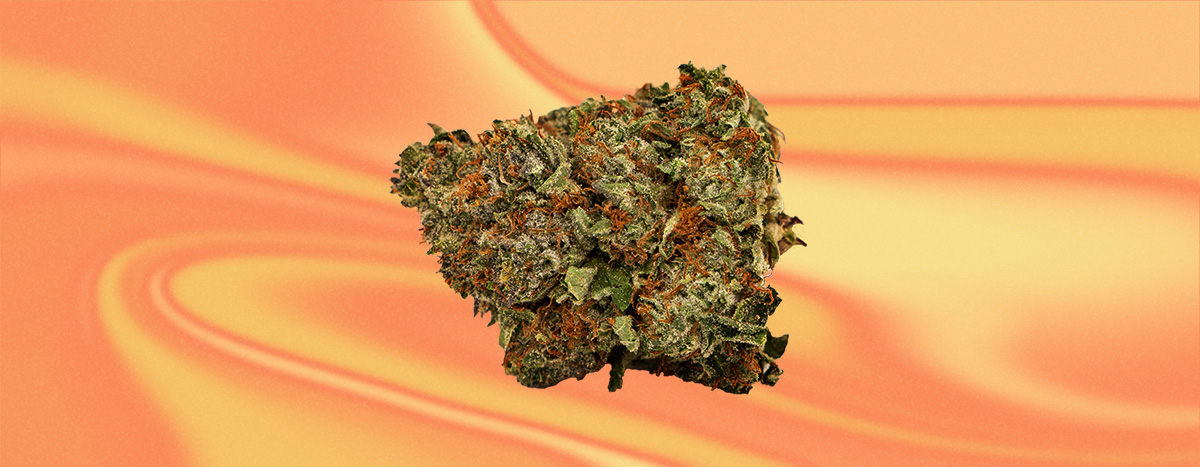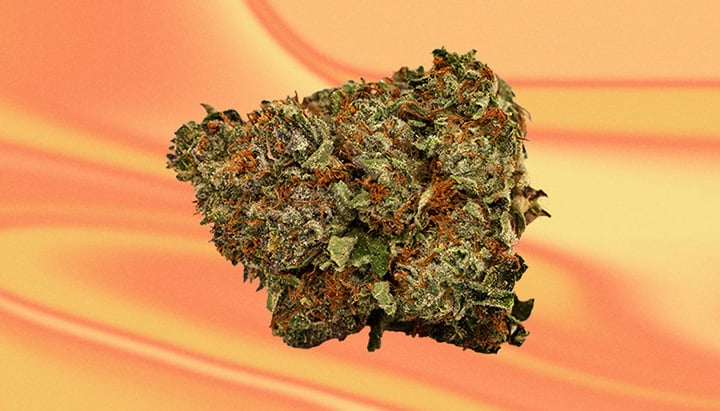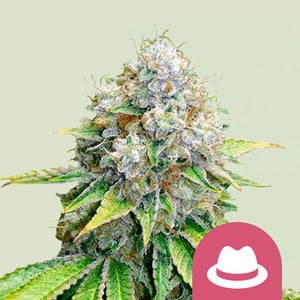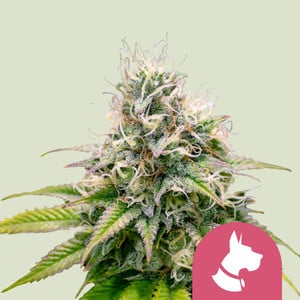.

Chemdawg strain: History, Flavor, Effects, and More
Chemdawg. Unless you live under a very large fan leaf, you'll have heard this name before—many times! But what exactly do you know about Chemdawg? Below, you'll get to know this variety on a deeper level, from her shrouded past to her flavor, effects, and growing traits. Become accustomed with this timeless titan.
Chemdawg, sometimes referred to as “chemdog”, is a legendary cannabis strain with a rather murky past. Despite her shrouded origins, this sativa-dominant cultivar has reached considerable fame in the cannabis world. You’ll find her buds everywhere from US dispensaries to Dutch coffeeshops and Catalonian cannabis clubs. But what makes this variety so special? And what can you expect when you place these seeds in the soil? You’re about to find out!
Discover everything worth knowing about Chemdawg, including her effects, growing traits, and flavor. Once you’re better acquainted, we’ll share some of the best strains our breeders have created using these popular genetics.
Contents:
Mysterious Origins: Where Did Chemdawg Come From?
Many modern cannabis strains have a clear family tree. Thanks to consistent efforts from breeders, we can confidently trace these hybrids all the way back to their landrace ancestors and geographical origins. However, things aren’t always this simple, as is the case with Chemdawg.
So, let’s start with what we do know. According to the individual who grew the first documented Chemdawg plant, he obtained the seed from a bag of Northern California weed that he scored at a Colorado Grateful Dead concert in 1991. Aptly named Chemdog, this grower has stated that growers used to call the strain by the names “Chem” and “Dog Bud” until these titles eventually fused into the contemporary name. These genetics wound up in the hands of cultivators all over the United States and, before long, overseas.


Genetic Roots: What Strains Make Up Chemdawg?
Unfortunately, the known lineage of Chemdawg stops at that bag of Cali weed. However, this hasn’t stopped growers from hazarding a guess of the strain’s origins. Some speculate that the strain first came about as US breeders crossed Thai and Nepalese sativa landraces. While a shot in the dark, this ancestry makes sense when growing and smoking Chemdawg; her towering colas and stimulating high certainly point toward sativa origins. Her earthy, musky and somewhat gassy bouquet also resembles that of the aforementioned supposed parent strains.
Identifying the exact parents of Chemdawg would help contemporary breeders create something similar of their own. However, we all have access to Chemdawg! Once only available as a cutting, the seeds of this variety are now easy to come by.
The Popularity of Chemdawg
It didn’t take long for the Chemdawg strain to gain serious traction in the cannabis community. This fiery sativa-dominant hybrid burst onto the scene after winning first place in the Hybrid category at the Cannabis Cup in Amsterdam the year Chemdog discovered her. Many years after establishing herself as one of the most cerebral strains around, this strain went on to win first-place awards at other prestigious events, including the High Times Cannabis Cup and Dope Cup.
How did Chemdawg reach such great heights at such a great speed? Well, she simply rode the wave of her own delightful terpenes and sky-high THC levels.
Find out more about the chemical constituents that make this strain so special, below.
What Terpenes Are in Chemdawg?
For those not clued up on terpenes, these are some of the aromatic molecules that contribute to the unique flavor and aroma of each strain. Not only do they influence the sensory pleasure of each variety, but they also directly contribute to the effects. So, what terpenes reign supreme in Chemdawg buds?
Three terpenes dominate Chemdawg’s profile: caryophyllene, myrcene, and limonene. Caryophyllene occurs as the most abundant, and adds a physically soothing element to the high. Next up, myrcene adds a touch of relaxation and a light stoning effect. Finally, limonene balances out the effects of myrcene and works side by side with THC to energise and stimulate.
Aroma and Flavor of Chemdawg
Aside from their effects, the three terpenes mentioned above add some delicious flavor to these flowers. Caryophyllene contributes peppery, spicy, and earthy elements to the blend, whereas myrcene, which occurs in mangos and lemongrass, adds fruity notes. Finally, limonene adds a layer of citrus that nicely rounds out the flavor profile found in these buds.
But terpenes aren’t the only chemicals that underpin the scent and taste of Chemdawg. This strain also packs plenty of volatile sulphur compounds. These chemicals add a skunky and gassy aroma to the mix that many cannabis users love.


THC Levels of Chemdawg
The THC levels within Chemdawg buds vary depending on the environment and how she’s grown. When exposed to enough light, watered well, and fed properly, she’s capable of producing astronomical levels of THC; some lab tests show levels as high as 32%. This amount of THC, combined with an arsenal of terpenes, results in a fast-acting high that elevates the mind to new heights. If you don’t green out, then expect to feel the irresistible urge to create something!
However, before you get too excited, this quantity only occurs in exceptional circumstances and phenotypes. Typically, she clocks in with a THC value of around 18% and CBG levels of 1%. Overall, you can expect a cerebral and stimulating effect that will force you out of your chair and into action.

Chemdawg: Morphology and Growing Traits
Chemdawg features a typical sativa morphology; think long branches, towering colas, and thin leaflets! She’ll grow to her full genetic potential in large containers or raised beds outdoors. However, with frequent training, she’ll also thrive in a large grow tent indoors. She’s a heavy feeder during the vegetative phase and requires soil rich in organic matter. Liquid feeds, such as seaweed and worm tea, also work wonders to keep her thriving. You can expect her to reach a height of between 4.9 – 6.6 feet depending on her container size, and to deliver huge yields after a relatively brief flowering time of 9–10 weeks.
RQS Strains That Descend From Chemdawg
Now that you’re aware of the botanical wonder of Chemdawg, check out some of our varieties that stem from this legendary strain! First up, we have Kali Dog, a sativa-dominant variety that descends directly from Chemdawg and Sour Diesel. This lady produces massive buds, skunky aromas, and an uplifting and clear-headed high.
If you prefer more stoning strains, you need to try our spin on OG Kush. Our breeders created this indica-dominant hybrid by crossing Chemdawg with the progeny of Lemon Thai and Pakistani Kush. With THC levels of 19% and plenty of fruity and piney terpenes, you’ll enjoy a mellow body high ideal for the evenings.
OG Kush
|
|
Chemdawg x Lemon Thai x Pakistani Kush |
|
|
15 to 17 oz/m² |
|
|
3 to 5 feet |
|
|
7 - 9 weeks |
|
|
THC: 19% |
|
|
Sativa 25% Indica 75% |
|
|
18 to 19 oz/plant |
|
|
6 to 7 feet |
|
|
October |
|
|
Calming, Uplifting |
Kali Dog
|
|
Chemdawg x Sour Diesel |
|
|
16 to 19 oz/m² |
|
|
3 to 5 feet |
|
|
8 - 10 weeks |
|
|
THC: 18% |
|
|
Sativa 55% Indica 45% |
|
|
18 to 19 oz/plant |
|
|
6 to 7 feet |
|
|
Late October |
|
|
Clear, Uplifting |
















































